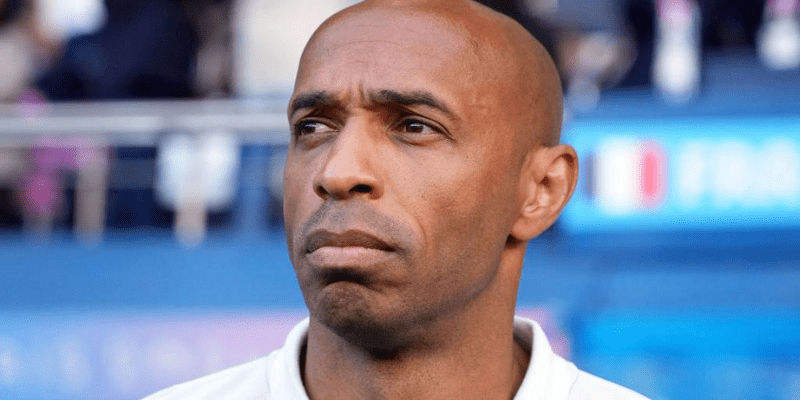As football fans, we love debates that spark imagination: who would win in a pure sprint, prime Thierry Henry or Kylian Mbappé today? When someone types is thierry henry faster than mbappe into Google, they’re usually trying to settle a feud across eras — a David vs. Goliath of pace. In this article, TigerKick will journey through stats, context, body mechanics, and tales from the pitch to answer: is Thierry Henry faster than Mbappé — and in which sense that question even makes sense.
Speed on paper: recorded top speeds

Let’s begin with cold, hard numbers. These are the snapshots that fuel every era-versus-era argument.
- Thierry Henry’s most-cited top speed is 39.2 km/h (≈ 24.3 mph), recorded in a Premier League match in 1998 (or attributed to that period).
- Mbappé’s highest confirmed in-match speed is generally listed around 38 km/h (≈ 23.6 mph), Henry edges Mbappé by about 1.2 km/h. That might not seem huge, but in sprint terms it’s a noticeable gap over short distance.
However — and this is crucial — comparing just “top speed” is like comparing peak horsepower — it tells you part of the story, not all.
Context matters: technology, tracking, and measurement bias
When comparing speeds across different football eras, we must consider how those speeds were recorded:
| Factor | For Henry’s era | Modern age (Mbappé) |
| Tracking systems | Basic match camera/video (some GPS but primitive) | Advanced optical tracking, GPS, wearable sensors |
| Sampling & smoothing | More error margin, occasional estimations | More data points, filtering, cross-validation |
| Pitch surface, boots, athletic training | Less optimized surfaces, heavier shoes | Better turf, lighter gear, conditioning |
Because modern tracking is more precise, Mbappé’s 38 km/h might understate what he could do in a perfect run. Meanwhile, Henry’s 39.2 km/h might have measurement anomalies, error, or rounding. So while Henry’s number looks superior, we must treat it with cautious respect.
Beyond just top speed: acceleration, sustainability, and game context

Raw top speed is just one piece. Let’s explore other dimensions:
Acceleration (0 to full pace)
Henry was famous for his burst over short distances, combining quick starts and change of direction. That kind of acceleration can make a higher top speed less relevant if the opponent doesn’t reach it.
Mbappé likewise is known for explosive starts, often leaving defenders behind within 10–20 meters. In real matches, that acceleration phase dominates over the full sprint.
Speed over sustained distance
No player remains at top speed for long. In real football, the sequence is: accelerate, reach near top pace, decelerate, turn, reaccelerate. The ability to maintain near-top speed over 20–30 meters is more valuable than an isolated max reading.
Game context and fatigue
In a match, physical fatigue, tactical constraints, and decision-making slow speed. Mbappé plays in an era of frequent transitions, pressing, and intervals of burst recovery. Henry’s era had different tactical rhythms. The ability to string multiple sprints in a match is part of modern elite athleticism.
Hypothetical match sprint: who wins?

Let’s imagine a pure 30-meter race, both fresh and at peak fitness:
- Over the first ~10 m, acceleration counts heavily.
- From 10–25 m, who has higher “top” is shown.
- After that, endurance and ability to resist deceleration kicks in.
Given Henry’s reputed top is slightly higher, in such a head-to-head he might win — but only if he matches Mbappé’s acceleration and stamina. But it’s hypothetical: you cannot perfectly replicate their prime states or conditions.
What the experts and lists say
Many “fastest players in history” rankings place Henry at or near the top, citing his 39.2 km/h as the fastest ever recorded in a top-flight match. Mbappé often shows up just behind, in the 37–38 km/h bracket. Some modern lists even place Mbappé above Henry, attributing improved measurement systems or unrecorded runs.
The consensus: Henry has the historical lead in recorded top speed, but many analysts and fans believe Mbappé — with modern fitness, tracking, and match demands — likely matches or surpasses that in many contexts.
So, is Thierry Henry faster than Mbappé?
In recorded top-speed numbers, yes — Henry’s 39.2 km/h edges Mbappé’s ~38 km/h.
But if you dig deeper, the question becomes blurry. Mbappé’s acceleration, repeated sprints, modern conditioning, and match context likely neutralize or overturn that narrow lead. In real matches, Mbappé arguably “feels” faster: defenders often look back in disbelief at the separation.
So is Thierry Henry faster than Mbappé? Only by raw historical record — but in practice, the edge today would likely go to Mbappé.
Final Thoughts
Is Thierry Henry faster than Mbappé? Today, that question is less about absolutes and more a celebration of two generations’ speed demons. Henry’s top speed is legendary. Mbappé’s modern arsenal of acceleration, stamina, and context-driven bursts make him a modern pure speed weapon.
Whether you lean Henry’s slight recorded edge or Mbappé’s real-world edge, you come away with awe. If you want more deep dives — like Henry’s game-changing runs or Mbappé’s match-sprint patterns — I’m ready to explore. Let TigerKick guide you into the speed legends next!



